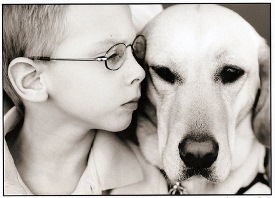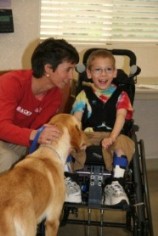Service Animals & Pet Therapy
Service Animals
According to the 2010 revisions of the ADA, a service animal is a dog that is individually trained to do work or perform tasks for a person with a disability. The dog must perform tasks that are specifically related to its owner’s disability. For example, a service animal for a person who is deaf might be trained to alert its owner when an alarm sounds or when the phone rings.
The ADA definition excludes animals that are not dogs, with an exception for miniature horses. However, other animals, such as monkeys and birds, even if not included in the ADA definition (and so not regulated by federal law), can also provide valuable services for people with disabilities.
What can service animals do?
Where can a service animal go?
- Is the dog a service animal required because of a disability?
- What work or task has the dog been trained to perform?
 177 KB) offers further information and free printable
resources.
177 KB) offers further information and free printable
resources.
- If you are in a place where the local or state laws differ from the federal laws, the least restrictive law applies.
- Allergies or fear of dogs are not acceptable reasons to deny a service dog’s entry. If it is possible, schedules should be arranged so the dog and the allergic or afraid person do not have to share the room at the same time. Otherwise, try to situate the dog in another part of the room.
- A person with a disability cannot be asked to remove his service animal from the premises unless: (1) the animal is out of control and the handler does not take effective action to control it, or (2) the animal is not housebroken. When there is a legitimate reason to ask that a service animal be removed, staff must offer the person with the disability the opportunity to obtain goods or services without the animal’s presence.
- Businesses that sell or prepare food must allow service animals in public areas even if state or local health codes prohibit animals on the premises.
- People with disabilities who use service animals cannot be isolated from other patrons, treated less favorably than other patrons, or charged fees that are not charged to other patrons without animals. Additionally, if a business (for example, a hotel) requires a deposit or fee to be paid by patrons with pets, it must waive the charge for service animals.
- If a business such as a hotel normally charges guests for damage that they cause, a customer with a disability may also be charged for damage caused by himself or his service animal.
- Staff is not required to provide care or food for a service animal.
- See ADA Requirements for Service Animals.
Service Dogs for Children
- Increased Independence
- Increased Awareness
- Improved Communication
- Safety
- Decreased Anxiety
- Self-Esteem
- Increased Social Interaction
Service animals can be trained specifically for the needs of the individual child. There are many organizations that train dogs for a specific disability or need.
Basic Service Dogs
Hearing Dogs
Seizure Alert Dogs
Guide Dogs
Dogs for Psychiatric Disabilities
Walker or Balance Dogs
Social Dogs
Autism Assistance Dogs
- Wandering: Autism assistance dogs are trained in search and rescue, so they’re great at finding a child who has wandered off or run away, as children with autism often do.
- Repetitive behaviors: An autism assistance dog can be trained to help a child recognize and address repetitive behaviors. For example, it might place its nose on the child’s foot if the child begins a repetitive behavior, reminding the child gently, patiently, and without judgment.
- Sleeping: Many children who have struggled to sleep through the night suddenly sleep soundly with their service dog nearby.
- Supervision and Security: Children can be tethered to their dog when out shopping or at the park, allowing parents peace of mind, and calming the child.
- Emotional bonding: The bond that often develops between a child with autism and her service dog can be surprising and deep. Children with autism service dogs often share affectionate relationships with their dogs, relationships they have been unable to develop with other people. Sometimes the child is even able to learn behaviors from working with their dog that are transferrable to their human relationships—hugging and kissing are a couple of examples.
Emotional Support Animal
An Emotional Support Animal (ESA) provides support and comfort for someone with a mental illness or disability. ESAs do not qualify as service animals according to federal law, but there are some special allowances made for them. They are eligible to live in “No pet” housing, or if there is a deposit or additional pet rent to live in a home, these must be waived, although owners of ESAs are still accountable for any damage caused by their animals. An ESA can also travel with its owner in the cabin of an airplane. ESAs require no special training. They need only be quiet and housebroken. If your doctor or psychiatrist determines that you will benefit from living with an ESA, he can sign a certificate or prescription for you.
Therapy Animals
Therapy animals are special pets who work as a team with their owner-handlers. These animals—most often dogs—are trained to give comfort and to interact in safe, non-threatening ways with people who are elderly, ill, or disabled. Therapy animals may visit places such as:
- hospitals
- rehabilitation centers
- nursing homes
- schools
- assisted living facilities
Therapy animals are specially trained and screened for the ability to interact with humans and other animals. They do not qualify as service animals according to federal law, and do not have the same protections as service animals. Some states have laws that give therapy animals and their handlers rights and protections.
Helper Monkeys
For people with mobility limitations, such as spinal cord injuries, Multiple Sclerosis, Muscular Dystrophy, or amputations, Capuchin Monkeys can be wonderful service animals. They have excellent fine motor skills and, like humans, they have hair instead of fur, eliminating allergy problems. Monkeys can be trained to help with things like using power buttons, turning pages, reaching for out-of-reach items. They are affectionate and small, and they live for up to 40 years.
The organization Helping Hands Monkey Helpers has been training monkeys and providing them free of charge since 1979.
Cost
A service animal can sometimes be expensive. Some families raise money for the cost of the service dog. Some find organizations that provide assistance, or trainers that provide service animals at no or low cost. There are also scholarships for training. Another thing to consider is the cost of the food and veterinary care for the service animal. Below are a few resources for funding opportunities.
Little Angels Service Dogs has a goal to provide all dogs at no cost to the handler with disabilities.
Autism Assistance Dogs list of funding resources.
Canine Companions for Independence provides a variety of assistance dog programs for people with disabilities or individuals who work with people with disabilities free of charge. CCI’s goal is to teach clients how to successfully manage and utilize these highly trained dogs.
Service Dogs for America partners with foundations to provide extra funding for a service dog for individuals with special needs.
Genesis Service Dogs is a nonprofit corporation that provides service dogs free of charge to qualified people with disabilities.
Resources
Information & Support
For Parents and Patients
United States Service Dog Registry
The US Service Dog Registry represents the most democratic realization of an assistance animal registry and training and behavior
standards agreement to date.
ADA Requirements for Service Animals
The revised ADA Requirements for Service Animals, as of March 2011, including the exception of miniature horses.
SE 08/27/21 link is working
Services for Patients & Families in Ohio (OH)
| Service Categories | # of providers* in: | OH | NW | Other states (4) (show) | | NM | NV | RI | UT |
|---|---|---|---|---|---|---|---|---|---|
| Assistive Technology Equipment | 36 | 47 | 46 | 44 | 72 | ||||
For services not listed above, browse our Services categories or search our database.
* number of provider listings may vary by how states categorize services, whether providers are listed by organization or individual, how services are organized in the state, and other factors; Nationwide (NW) providers are generally limited to web-based services, provider locator services, and organizations that serve children from across the nation.
Authors & Reviewers
| Authors: | Tina Persels |
| 2014: first version: Shena McAuliffe, MFAR; Gina Pola-MoneyR |


 Get More Help in OH
Get More Help in OH
